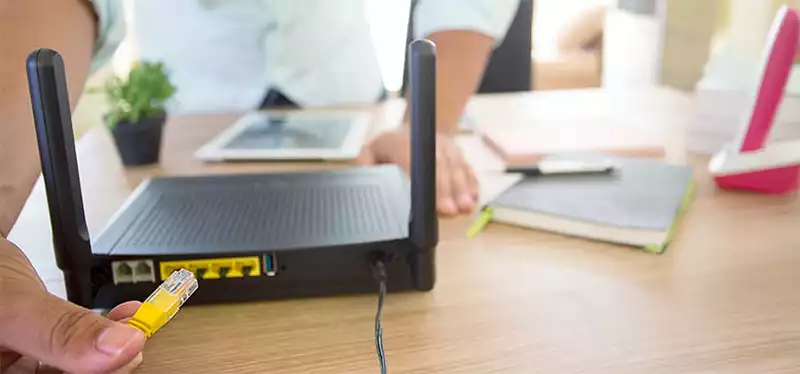You can also be interested in these:
- Why do you need cybersecurity for your router?
- What is the USB port on my router for?
- Can I change the location of my modem?
- Does using an Ethernet cable affect the WiFi speed?
These days, it’s typical for computers to be perpetually connected to the internet. It’s not really too surprising, because most of your computer’s functionality is intrinsically tied with being online at all times. Computer’s being constantly online was true before the pandemic, and now it especially applies to people everywhere as we all stay home trying to busy ourselves.

If you’re one of these people, then you may have noticed something odd within your household, where some computers have sluggish and slow internet while the rest move at a brisk pace online. Problems like this have always been around, but people being stuck at home has exacerbated it and made it far more noticeable, and people aren’t happy about it.
Now, worry not, we’ve got you covered. We’re here to break down exactly why your internet is slow on one computer but fast on another, what factors contribute to it taking place, and what you can do to prevent or circumvent it. So, let’s get straight into it!
Reason 1: Your computer’s location
Your router is the source of Wi-Fi in your household, and every device needs to go through it in order to get internet access. But what happens when your computer happens to be the farthest away from the router, stuck behind multiple floors and walls? Well, in this case, your PC’s going to be experiencing some pretty apparent slowdown whenever you try to do anything on it.
The farther away your computer is from the router, the higher the chances are of you going through moments of lag, slowdown and dropped connections will be. Objects like TVs, tables, cabinets and especially walls will also weaken the signal, which can further complicate things.
To fix this, you can relocate your computer so that it’s not too far away from the router to the point everything you do gets slowed down. On top of that, it’s also a good idea to move your router to a more centralized location so that everyone can get to use it at the same rate. Make sure to place it at a higher elevation so that random objects don’t get in the way of the signal nearly as much.
If you don’t mind spending a little extra, you could also purchase a Wi-Fi extender to enhance the router signal’s strength and range. There’s also the choice of getting a mesh network, which creates a web of nodes that cover many different areas within your home. This means every device can connect to the closest node for a more stable internet connection instead of jostling for the router’s attention.
Though it requires a bit of elbow grease on the user’s end, you can also choose to use a LAN cable to mitigate this issue completely. You’ll need to set up the cable’s route, do some management to make sure things are neat and then keep the cable safe over longer periods of time, but the result is well worth it in the end. Ultimately, also changing the location of your modem can be a more desperate but definitive solution to equalize the distribution of the internet signal around your house.
Reason 2: Network adapter issues
Network adapters inside computers are notorious for being fickle, often times malfunctioning for no apparent reason. Whenever this happens, it’s a good idea to give the adapter a reset and check whether there are any driver updates to see if it’s the source of the problem. Despite its name, the process is quite simple, so get into the habit of doing it often.
First of all, turn on your computer and head straight into the Control Panel. Look for the ‘Network and Internet’ tab and look for the Network and Sharing Center. Click on it, and you’ll find an option to change your adapter settings. Right click on the connection and disable it. Leave it turned off for about 10 seconds, and then turn it back on again. Once you’re done, test out your internet speeds.

So, what if the issues persist? Go back to the same section of your control panel, but this time select to check your network adapter and see if it has any driver updates available. Updating these is important, it keeps your device up to the latest standards, and not being up-to-date can lead to slowdowns.
If it fixed the issue, then congratulations, you’ve learned to sort out one of the most common network connectivity problems around. Anytime you experience slowdown again, you can give it a go just to see if it’s the adapter acting up again. In the case it’s not however, then you’ll want to move on to the next section.
Reason 3: Corrupt TCP/IP stacks affecting connection
It can be incredibly difficult to troubleshoot an issue that depends a lot on user experience to identify. Many less experienced users can find themselves on a wild goose chase with issues like these, and this is specifically the case when it comes to corrupt TCP/IP stacks.
A corrupt TCP/IP stack can be the cause of the network issues you’re having, but what causes the corruption in the first place can be incredibly hard to place. On top of that, corrupt TCP/IP stacks can surface as a plethora of different issues, especially as slowdown when you’re on the internet. Thankfully, it’s quite easy to reinstall TCP/IP stacks these days.
You can remove and reinstall the TCP/IP or reset it by following the steps below:
- Go to your Windows Menu and search for your Command Prompt.
- Launch the Command Prompt.
- Type in “netsh int ip reset” without the quotation marks and then press enter.
- Reboot your computer system.
Once these are done, test out your PC’s internet connection to see if there’s still any slowdown. Ideally, after all these fixes, your internet connection will be running at optimal speed for the foreseeable future!
Conclusion
Now that you’ve successfully managed to fix your network issues, go ahead and give yourself a well deserved pat on the back and continue doing what you were planning to do. It can be difficult to figure out network issues, but with modern technology it’s a simpler process to fix them. We hope this guide will continue to help you weed out connectivity issues in the future!
More stories like this
- Why do you need cybersecurity for your router?
- What is the USB port on my router for?
- Can I change the location of my modem?
- Does using an Ethernet cable affect the WiFi speed?
- Acer Predator Connect X5 full review
- Asus CMAX6000 router review